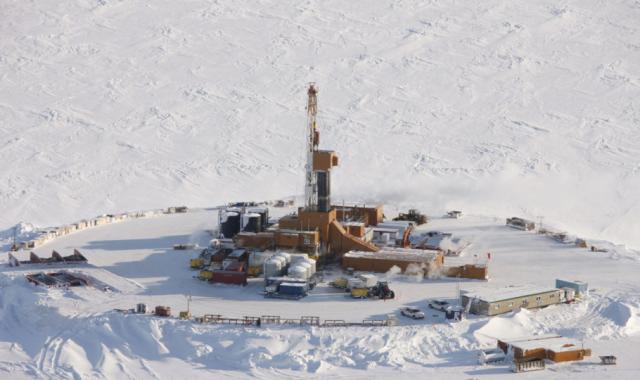
Caelus Energy's shallow-water discovery offshore Alaska could hold as much as 10 billion barrels of oil in place. (Source: Caelus Energy)
The world’s supply of oil is expected to get larger after Caelus Energy Alaska LLC unveiled a light oil discovery that could hold at least an estimated 6 billion barrels (Bbbl) of oil in place on the North Slope.
Targeting a Brookian submarine fan complex that covered more than 300 square miles, the Caelus-Tulimaniq #1 exploration well and Caelus-Tulimaniq #2 step-out each hit hydrocarbon columns of more than 1,000 ft, logging 183 ft and 223 ft of net pay, respectively, Dallas-based Caelus Energy said.
The privately held independent E&P shared news of the find on its Smith Bay state leases on Oct. 4, adding there may be up to 10 Bbbl of oil in place when nearby acreage becomes part of the mix. Anticipated recovery factors are between 30% and 40%, which would make the discovery one of the largest ever for Alaska.
Caelus CEO Jim Musselman said the find has the “size and scale to play a meaningful role in sustaining the Alaskan oil business over the next three or four decades,” but “fiscal stability going forward is critical for a project of this magnitude.”
Sidewall coring and analyses confirmed the presence of light oil ranging from 40 degree API to 45 degree API gravity; however, seasonal time constraints prevented flow testing for both wells, the company said.
Analysts with Tudor, Pickering, Holt & Co. (TPH) called the discovery “encouraging to see but [it] remains the exception to the rule.”
The discovery comes as Alaska North Slope oil production falls and the number of worldwide conventional oil and gas finds trails previous years. Exploration spending has taken a backseat to drilling capex, which has also dwindled in reaction to lower commodity prices and less profit.
The number of conventional oil and gas discoveries made worldwide—both onshore and offshore—in 2015 was 191, less than half of the average annual number of discoveries for the previous nine years, according to Wood Mackenzie.
Oil production on Alaska’s North Slope has fallen from about 2 MMbbl/d in 1988 to 465 Mbbl/d in 2015, according to U.S. Energy Information Administration data.
However, rising commodity prices—which have rebounded from lows of about $27/bbl earlier this year to just under $50/bbl on Oct. 5—falling U.S. crude stocks, and an agreement by members of the OPEC to slow production may lead to a resurgence of activity elsewhere.
But Musselman, a co-founder of Kosmos Energy, credited Alaska state tax credits for enabling the company to explore in Alaska.
“Without the state tax credit programs, none of this would’ve happened, and I’m not sure Caelus would’ve come to explore in Alaska. We’re proof that the credit programs work,” Musselman said in a statement.
As for the discovery, an appraisal program is underway and the results could provide insight on future drilling locations, which could increase reserves. Plans are to drill an appraisal well and obtain a new 3-D seismic survey over outboard acreage, Caelus said.
“Additional drilling and seismic should improve estimates of oil in place via delineation of undrilled fan lobes and channel complexes imaged on the original 3-D seismic,” the company said. “In parallel, Caelus is studying and planning the facilities buildout, which will process and transport the oil to [the Trans-Alaska Pipeline System].”
The development could provide 200 Mbbl/d of light oil.
TPH analysts said the discovery is likely to turn attention to Armstrong and Repsol’s joint exploration program on the North Slope as the companies aim to add to their 1.4 Bbbl of oil already discovered. The onshore acreage is closer to existing infrastructure. Others active in the area include 88 Energy and Great Bear Petroleum, which TPH said is “targeting both conventional and unconventional rocks.”
In 2014 Caelus Energy Alaska closed on its $300 million purchase of Caelus Energy Alaska Smith Bay LLC, which made the discovery, from Pioneer Natural Resources Co. (NYSE: PXD). In all, Caelus has a 75% working interest ownership in 26 leases that span 117,000 acres in Smith Bay, which is about 150 miles west of Prudhoe Bay.
Velda Addison can be reached at vaddison@hartenergy.com.
Recommended Reading
What's Affecting Oil Prices This Week? (Feb. 10, 2025)
2025-02-10 - President Trump calls for members of OPEC+ and U.S. shale producers to supply more oil to push down oil prices to the neighborhood of $45/bbl.
What's Affecting Oil Prices This Week? (Feb. 24, 2025)
2025-02-24 - Net long positions of WTI have decreased by 59% since Jan. 21 and are 61% below the level seen on July 16, 2024, when the price of WTI was $80.76.
What's Affecting Oil Prices This Week? (March 24, 2025)
2025-03-24 - Oil demand will be picking up as we move into warmer months for the northern hemisphere. For the upcoming week, Stratas Advisors think the price of Brent crude will move higher and will test $73.
US Crude Oil Stocks, Excluding SPR, Fall to 2-Year Low, EIA Says
2025-01-15 - Crude inventories fell by 2 MMbbl to 412.7 MMbbl in the week ending Jan. 10, the EIA said, compared with analysts' expectations in a Reuters poll for a 992,000-bbl draw.
What's Affecting Oil Prices This Week? (March 10, 2025)
2025-03-10 - Prices were weighed down by concerns about economic growth, in part, because of more tariffs being imposed by the Trump administration, and OPEC+ reiterating that its production cuts would start unwinding in April.
Comments
Add new comment
This conversation is moderated according to Hart Energy community rules. Please read the rules before joining the discussion. If you’re experiencing any technical problems, please contact our customer care team.





